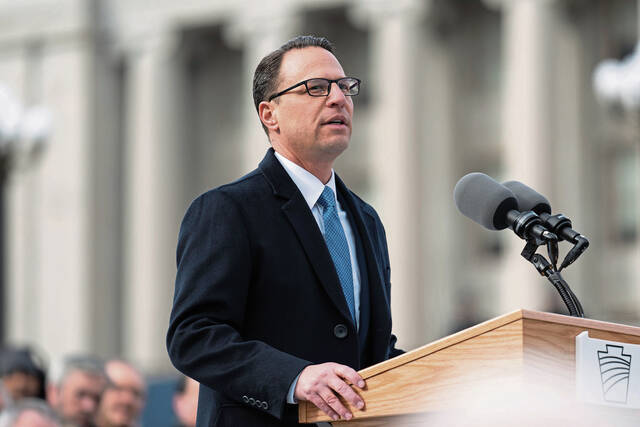Already there are questions about the cost to cap tuition and fees for many state university students at $1,000 a semester and who would pay — not to mention bringing state universities and community colleges under one umbrella.
There are regulatory, legal and logistical hurdles, all in a state whose Legislature and governor for decades have shown little commitment to bringing order to what some call Pennsylvania’s “Wild West” approach to coordinating its higher education system.
But a model that many have long viewed as broken is showing increasing signs of stress, as evidenced by falling enrollment on private campuses and public branches of Penn State University, the University of Pittsburgh and the State System of Higher Education.
What remains to be seen is if all that will give Gov. Josh Shapiro enough leverage as he proposes to overhaul how the Commonwealth manages hundreds of public and private campuses.
Shapiro, who announced his plans Friday, framed the problem in his first state budget address a year ago when he announced a working group to study higher education.
“Think about it: Colleges are competing with one another for a limited dollar. They’re duplicating degree programs. They’re driving up the cost, and they are actually reducing access particularly for so many in our minority communities,” he said. “As enrollment declines and questions about the value of a college degree persist, it’s on all of us to once and for all have an honest dialogue about higher education in Pennsylvania.”
The Democratic governor’s plan for funding higher education was panned by state Senate President Pro Tempore Kim Ward, a Hempfield Republican. The General Assembly would consider the governor’s request to fund the plan.
“This is not a blueprint. It’s a page stolen from the Biden Administration’s playbook. While Gov. Shapiro’s words offer hope, this announcement seems premature as it is light on details and does not mention cost to taxpayers,” Ward said in a statement.
Students at Westmoreland County Community College near Youngwood had no complaints about Shapiro’s proposal.
“I’m fine with whatever it is,” said Christopher Rudnik, a Hempfield Area High School graduate who had a large study room to himself Friday.
Rudnik is a full-time student studying computer science so he could get a job in information technology. His part-time job at a Hempfield restaurant pays for his tuition and spending money, but if Shapiro’s proposal for higher education becomes a reality, he and thousands of other students at the 15 community colleges in Pennsylvania would save thousands of dollars.
Tuesday Stanley, president of Westmoreland County Community College, praised Shapiro in a statement for his initiative and commitment to the students.
WCCC has always focused on affordability, access and student success, Stanley said in the statement. The community college has course transfer agreements with the 14 other community colleges in the state and several of the state-related universities, including Pennsylvania Western University at its California, Clarion and Edinboro campuses and Indiana University of Pennsylvania.
State Senate Majority Leader Joe Pittman, R-Indiana, said he wants more details.
“I appreciate the perspective put forth by Gov. Shapiro within his proposal and believe his plan is well intended,” Pittman said. “The types of changes being proposed are no small undertaking, and notably absent from the announcement is the amount of funding required to effectuate the plan.”
Cost to taxpayers and impacts to local communities where campuses are located need to be considered, he said.
“Details matter,” he said.
State System leaders, who have held tuition unchanged at $7,716 for five years, were more optimistic.
“The governor’s proposal is a real opportunity to build upon the strengths of PASSHE universities and the community colleges. Together we can create a new, larger system with better collaboration that gives students more pathways to a degree or credential,” Chancellor Daniel Greenstein said.
“This is a wonderful opportunity for the 10 PASSHE colleges and 15 community colleges to work together to develop a system that is accessible, affordable and creates opportunities for Pennsylvanians across the Commonwealth,” said Quintin Bullock, president of Community College of Allegheny County.
University of Pittsburgh Chancellor Joan Gabel called the plan innovative.
“Pitt looks forward to working with the Shapiro Administration and the Legislature to enact a higher education plan that delivers for students and puts Pennsylvania on a path to a more competitive workforce and a more robust economy,” she said.
Shapiro is expected to provide more details when he delivers his budget address to the Legislature on Feb. 6.
He is proposing that direct appropriations to publicly funded colleges and universities “be disbursed through a predictable, transparent, outcomes-focused formula that will incentivize colleges and universities to focus on what’s most important to the Commonwealth.”
Shapiro also proposes Pennsylvanians “making up to the median income will pay no more than $1,000 in tuition and fees per semester at state-owned universities and community colleges.”
For students at state-related universities, including Pitt and Penn State, and independent colleges, PHEAA grants would increase by $1,000.
Pennsylvania ranks as one of the costliest states in tuition and fee costs and near the bottom in taxpayer support. Population loss, fewer high school graduates and questions about the value of a four-year degree versus student debt have helped create empty classroom seats — even at State System campuses that are the Commonwealth’s least expensive university option.
“The governor’s plan will strengthen our State System of Higher Education and our community colleges, make higher education more affordable for those who want to seek it, and provide a better governance structure,” said state Senate Minority Leader Jay Costa, D-Forest Hills.
Kenneth Mash, president of the state university faculty union, said he wants more information but sees potential.
“The question about student costs depends on all aspects of the plan,” said Mash, president of the Association of Pennsy lvania State College and University Faculties. “I certainly think the governor deserves credit for focusing on an issue that has long been discussed only in pieces.”








